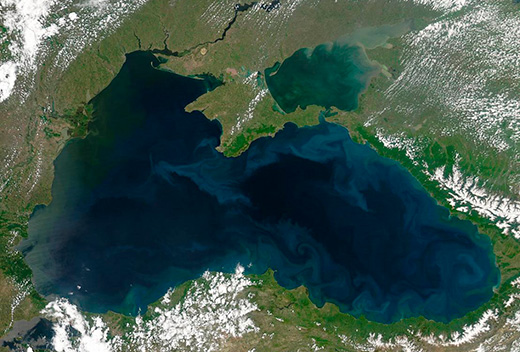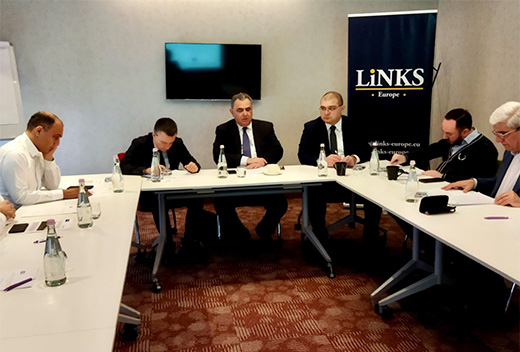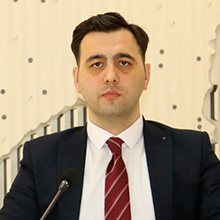
Turkey’s Endgame in the Normalization Process with Armenia  By Benyamin POGHOSYAN, PhD, Chairman, Center for Political and Economic Strategic Studies By Benyamin POGHOSYAN, PhD, Chairman, Center for Political and Economic Strategic Studies
Armenia–Turkey normalization process was officially launched on January 14, 2022 when special representatives – the Deputy Speaker of the Armenian Parliament Ruben Rubinyan and Ambassador Serdar Kılıç – met in Moscow. The groundwork for this meeting began in mid-2021, when the Armenian government proposed the idea of peace in the South Caucasus and normalizing relations with Azerbaijan and Turkey. Armenia’s catastrophic defeat in the 2020 Karabakh war seemed to put aside one of the main obstacles to launching the Armenia–Turkey normalization process. The 2008-2009 “football diplomacy” failed mainly due to Turkey’s precondition to Armenia to return “occupied lands” to Azerbaijan. By signing the November 10, 2020 statement, the Armenian government accepted the loss of seven regions outside the former Nagorno Karabakh Autonomous Region (NKAR), as well as 30-percent of territories of NKAR itself. READ MORE
- EGF Editor |
Published on EGF: 12.05.2022
| External Relations
-
How Will the Ukraine Crisis Shape the World Energy Market?
 By Fuad SHAHBAZOV, Baku-based independent regional security and defence analyst By Fuad SHAHBAZOV, Baku-based independent regional security and defence analyst
Russian military aggression against Ukraine launched almost two months ago has clearly signalled a change in the traditional world order and triggered the unprecedented reaction of the Western coalition led by the U.S. The ongoing conflict between Russia and Ukraine has left the global energy market uncertain, threatening to cause severe energy shortages and oil prices exceeding $110 per barrel.
Since the Russian intervention in Ukraine kicked off, numerous sanctions packages have been imposed on Russia, hitting mostly financial institutes and state-owned companies. This resulted in Western countries’ consolidation, and the collective refusal of Russia-related transactions and import of Russian natural gas, oil, and coal. READ MORE
- EGF Editor |
Published on EGF: 12.05.2022
| Energy
-
A Path to a Peace Agreement between Armenia and Azerbaijan  By Benyamin POGHOSYAN, PhD, Chairman, Center for Political and Economic Strategic Studies By Benyamin POGHOSYAN, PhD, Chairman, Center for Political and Economic Strategic Studies
While the world continues to follow the war in Ukraine and the growing tensions in relations between Russia and the West, Armenia and Azerbaijan are ready to launch negotiations to sign a peace treaty. All external powers involved in the region’s geopolitics – Russia, the US, the EU, Turkey, and Iran – support this process. Armenia and Azerbaijan will soon launch three separate, though interconnected, processes: the start of the work of the bilateral border delimitation and demarcation commission, the restoration of communications infrastructure, and the launch of negotiations on a peace treaty. These issues are discussed on two parallel platforms – Armenia-Azerbaijan-EU and Armenia-Azerbaijan-Russia. Both Russia and the EU support the start of work on all three tracks. READ MORE
- EGF Editor |
Published on EGF: 05.05.2022
-
Armenia Faces a Critical Choice in Nagorno-Karabakh  By Benyamin POGHOSYAN, PhD, Chairman, Center for Political and Economic Strategic Studies By Benyamin POGHOSYAN, PhD, Chairman, Center for Political and Economic Strategic Studies
April 2022 was marked by significant developments around the settlement of the Nagorno-Karabakh conflict. When Russia launched a “special military operation” in Ukraine on February 24, it seemed that all other post-Soviet conflicts would enter “silent mode,” as no one would care about Nagorno-Karabakh, Abkhazia, South Ossetia or Transnistria. However, this was not the case, at least for Nagorno-Karabakh. On April 6, 2022, the European Union organized an Armenia–Azerbaijan summit in Brussels. President Aliyev and Prime Minister Pashinyan agreed to form a border demarcation/delimitation commission until the end of April and take concrete steps to start peace talks. The issue of border delimitation and demarcation also was among key priorities during the November 2021 Sochi meeting facilitated by Russian President Putin. However, despite the signature of the trilateral statement, no tangible moves have been made. READ MORE
- EGF Editor |
Published on EGF: 28.04.2022
| External Relations
-
Black Sea Security in Times of War  By Eugene KOGAN, Tbilisi-based defence and security expert By Eugene KOGAN, Tbilisi-based defence and security expert
There is no doubt that the ongoing Russian military action against Ukraine profoundly affects the rest of the Black Sea littoral states: Bulgaria, Georgia, Romania and Turkey. The tense standoff of recent weeks placed each of them in a difficult position between apprehension and, particularly with Turkey, a kind of peacemaker or rather mediator, which Russia now ignores completely.
Romanian Defence Minister, Vasile Dincu, said in January 2022 that “Russia, at the moment, is not a direct threat to Romania, but it is [rather] a threat to security in the [Black Sea] area”. The author disagrees with the minister’s statement since the Russian military, which is stationed on the occupied Crimean peninsula - not much more than 100 km from the Danube Delta – is a direct threat to Romania, even though Russian officials will blame the other side for posing a threat to Russia. Furthermore, the region’s three NATO member countries, namely Bulgaria, Romania and Turkey, have until today been unable to create and implement a comprehensive Black Sea security strategy together with NATO aspirants Georgia and Ukraine to counter the challenges posed by Russia. The latter, however, successfully implemented its divide and rule policy in the region. READ MORE.
- EGF Editor |
Published on EGF: 21.04.2022
| Security
-
Quo Vadis Nagorno-Karabakh  By Benyamin POGHOSYAN, PhD, Chairman, Center for Political and Economic Strategic Studies By Benyamin POGHOSYAN, PhD, Chairman, Center for Political and Economic Strategic Studies
The discussions about possible Armenia – Azerbaijan peace treaty surfaced again during the last Pashinyan – Aliyev meeting held in Brussels on April 6, 2022. At their meeting which was hosted by the European council president, Charles Michel, the two leaders agreed to instruct their foreign ministers to prepare for the start of the negotiations. On April 11, the Armenian and Azerbaijani foreign ministers held a phone talk and discussed the details of the upcoming process. The EU was not the only external actor pushing forward for the peace deal. Before and after the April 6 meeting in Brussels, Aliyev and Pashinyan spoke separately with Russian President Putin, who emphasized the significance of peace and reiterated Russia's willingness to support Armenia and Azerbaijan. The US Secretary of State Blinken also confirmed the US readiness to facilitate the comprehensive settlement between Armenia and Azerbaijan. READ MORE
- EGF Editor |
Published on EGF: 21.04.2022
| External Relations
-
The South Caucasus from War to Peace: 30 Measures between Now and 2030  Joint Armenian-Azerbaijani Liaison Group on confidence-building measures Joint Armenian-Azerbaijani Liaison Group on confidence-building measures
The Joint Armenian-Azerbaijani Liaison Group on confidence-building measures in support of lasting peace in the South Caucasus has published its report in which it proposes 30 short, medium and long term measures in support of ongoing efforts to establish peace in the region. On Wednesday, 6 April, members of the Working Group, presented their report to the EU Special Representative for the South Caucasus, Toivo Klaar, and other EU officials at a special briefing in Brussels. In their report, published on the eve of the meeting between the leaders of Armenia and Azerbaijan and the president of the European Union in Brussels on 6 April, the group says that "all the ingredients for peace exist in the South Caucasus. All the ingredients for war exist too. What is in front of us is a choice". The group says that the proposed measures are a building block in the quest for peace but if the ideas being proposed are implemented the objective of building a peaceful, secure and prosperous South Caucasus will be much closer to being achieved. It was now necessary that all concerned should put effort into turning the thirty measures being proposed in the report into tangible action.
The work of the Joint Liaison Group was co-ordinated and facilitated by LINKS Europe - an independent foundation based in The Hague, The Netherlands - in the framework of the European Union's EU4Peace initiative. READ MORE
- EGF Editor |
Published on EGF: 13.04.2022
| External Relations
-
New Meeting between Pashinyan and Aliyev in Brussels: What next  By Benyamin POGHOSYAN, PhD, Chairman, Center for Political and Economic Strategic Studies By Benyamin POGHOSYAN, PhD, Chairman, Center for Political and Economic Strategic Studies
On April 6, 2022, Armenian Prime Minister Nikol Pashinyan and Azerbaijani President Ilham Aliyev held a meeting in Brussels mediated by the President of the European Council, Charles Michel. It was the second meeting in Brussels mediated by the European Union. The first took place in December 2021; on February 4, 2022, Armenian and Azerbaijan leaders held an online meeting with the participation of Michel and French President Emmanuel Macron. A week before the April 6 meeting, the EU hosted a meeting of high-level officials from Armenia and Azerbaijan in Brussels to advance joint efforts to find solutions to issues between both countries. The meeting between Secretary of the Security Council of Armenia Armen Grigoryan and assistant to the President of Azerbaijan Hikmet Hajiyev was facilitated by the EU Special Representative for the South Caucasus Toivo Klaar. As a result of the April 6 meeting, Pashinyan and Aliyev agreed to instruct their Ministers of Foreign Affairs to work on the preparation of a future peace treaty, which would address all necessary issues. READ MORE
- EGF Editor |
Published on EGF: 13.04.2022
| External Relations
-
Iran and the Second Karabakh War: Assessing the New Balance of Power in the South Caucasus
 By Fuad SHAHBAZOV, Baku-based independent regional security and defence analyst By Fuad SHAHBAZOV, Baku-based independent regional security and defence analyst
The second Karabakh war between Azerbaijan and Armenia in September of 2020 opened a new page in the modern history of the post-Soviet region and explicitly changed the geopolitical landscape in the South Caucasus. With Baku regaining control over large swathes of territories, Turkey has obtained a greater role in the region, acting as a guarantor of the ceasefire regime between Azerbaijan-Armenia alongside Russia, whereas Iran’s diminished position has gotten less attention. Indeed, in the post-war period, Tehran saw a steep decline in its regional influence in the Southern Caucasus, losing its direct land route to Armenia and facing the growing influence of Russia, Israel, and Turkey. Prior to the conflict, Iran had long pursued a balanced foreign policy in the region, developing a partnership with Armenia and Azerbaijan, respectively. However, Turkey’s close relations with Azerbaijan since the 1990s prevented Iran from establishing powerful leverage over this country, unlike landlocked Armenia, which has relied on Iran as one of the main economic partners. READ MORE
- EGF Editor |
Published on EGF: 13.04.2022
| Security
-
The Rising Strategic Role of Azerbaijan in Euro-Asian Economic Relations  By Ayaz MUSEYIBOV, Head of Department, Center for Analysis and Communication of Economic Reforms of the Republic of Azerbaijan
By Ayaz MUSEYIBOV, Head of Department, Center for Analysis and Communication of Economic Reforms of the Republic of Azerbaijan
Currently, energy and trade routes security is one of the major considerations at the global level. In the wake of the recent global events, the importance of energy resources is more likely to become a dominant matter which the global economy tremendously needs.
Energy supply to Europe, particularly to South and South-Eastern Europe, depends on only one source. However, the European Commission is accelerating the economic diversification processes beginning with the gas routes in order to reduce the economic dependency. Hence, the EU has already held various talks with energy players such as Egypt, Qatar, the United States, South Korea, Nigeria, and Azerbaijan to increase natural gas supplies in the case of a gas crisis. READ MORE
- EGF Editor |
Published on EGF: 06.04.2022
| Markets
-
|
|
